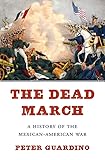The dead march : a history of the Mexican-American War / Peter Guardino.
Material type: TextLanguage: Eng Publisher: Cambridge, Massachusetts : Harvard University Press, 2017Description: 502 pages : illustrations, maps ; 25 cmISBN:
TextLanguage: Eng Publisher: Cambridge, Massachusetts : Harvard University Press, 2017Description: 502 pages : illustrations, maps ; 25 cmISBN: - 9780674972346
- Mexican War, 1846-1848
- Guerra -- 1846-1848
- United States -- Economic conditions -- To 1865
- United States -- Social conditions -- To 1865
- Mexico -- Economic conditions -- 19th century
- Mexico -- Social conditions -- 19th century
- North America -- Economic conditions -- 19th century -- Regional disparities
- México -- Historia -- guerra con Estados Unidos, 1846-1848
- Estados Unidos -- Condiciones económicas
- Estados Unidos -- Condiciones económicas -- Hasta 1865
- América del Norte -- Condiciones económicas
- México -- Condiciones económicas
- México -- Condiciones sociales
- 973.6/2 23
- 002 E 404 G914d 2017
| Item type | Current library | Home library | Collection | Shelving location | Call number | Copy number | Status | Date due | Barcode |
|---|---|---|---|---|---|---|---|---|---|
 Libro
Libro
|
Biblioteca Juan Bosch | Biblioteca Juan Bosch | Recursos Regionales | Recursos Regionales (2do. Piso) | 002 E 404 G914d 2017 (Browse shelf(Opens below)) | 1 | Available | 00000123157 |
Browsing Biblioteca Juan Bosch shelves, Shelving location: Recursos Regionales (2do. Piso), Collection: Recursos Regionales Close shelf browser (Hides shelf browser)

|
No cover image available |

|

|

|

|

|
||
| 002 E 208 C767s 2013 A short history of the American Revolutionary War / | 002 E 208 L244a 1958 The American heritage book of the Revolution / | 002 E 249 F383b 2016 Brothers at arms : American independence and the men of France & Spain who saved it / | 002 E 404 G914d 2017 The dead march : a history of the Mexican-American War / | 112 E 407 H497g 2007 A glorious defeat : Mexico and its war with the United States / | 002 E 445 M847e 2009 Esclavitud y libertad en los Estados Unidos : de la colonia a la independencia / | 002 E 449 G863o 2014 On Slavery and Abolitionism / |
Includes bibliographical references (pages 373-484) and index.
No honest man can be destined for military service -- We're the boys for Mexico -- Waging war like a civilized nation -- Mexico's citizen soldiers -- Guerilla campaign -- Defending the Valley of Mexico -- Bloodshed and brutality -- Ashamed of my country -- The Treaty of Guadalupe Hidalgo.
The bloody 1846-1848 war between the United States and Mexico filled out the shape of the continental United States, forcing Mexico to recognize its loss of Texas and give up the rest of what became the Southwestern United States. Generally people argue that the United States won this war because unlike Mexico it was already a unified nation that commanded the loyalty of its citizens. Focusing on the vivid experiences of ordinary soldiers and civilians, both Americans and Mexicans, The Dead March reveals something very different. The United States won not because it was more unified but instead because it was much wealthier. Both Americans and Mexicans had complicated relationships with their nations, relationships entangled with their commitments to their religions, their neighbors, and their families. The war's events, both on the grand scale of the conflict between nations and the more intimate scale of campaigns and battles, cannot be understood without probing this social and cultural history. Politicians could not simply conjure up armies, and generals could not manipulate units as if their members were chess pieces without ideas or attitudes. This book also uses the war to compare the two countries as they existed in 1846. The results of this comparison are quite startling. The United States and Mexico were much more alike than they were different, and both nations were still in the tumultuous and often violent process of constituting themselves. What separated them was not some fabled American unity or democracy but the very real economic advantages of the United States.-- Provided by publisher


There are no comments on this title.